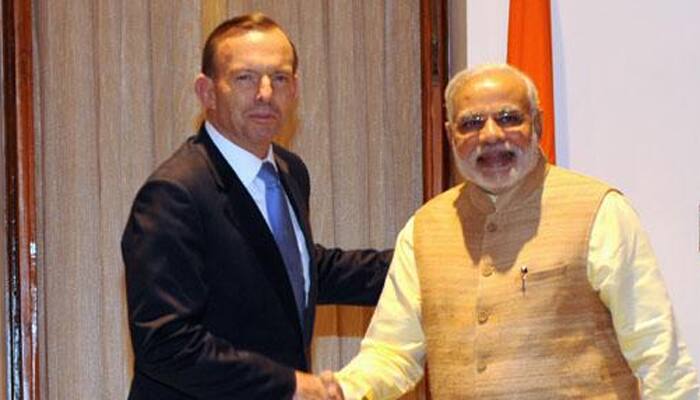New Delhi: India and Australia on Friday inked a significant civil nuclear agreement which will allow Canberra to supply uranium to the energy-starved country even as the two countries discussed ways to enhance cooperation in key areas of security and trade.
While addressing a joint press conference with his Australian counterpart Tony Abbott, PM Narendra Modi said India considers Australia a very important strategic partner and wishes to deepen the relations.
“The signing of civil nuclear agreement is a historic milestone and it will open a new chapter in our bilateral cooperation,” PM Modi said.
The Indian prime minister confirmed that he will pay a bilateral visit to Australia after the G20 summit.
Giving details about his meet with Abbott, Modi said, “We have decided to enhance dialogue and increase security and defence cooperation.”
“We will increase partnership to fight terrorism and cyber threats and strengthen economic relationship between India and Australia, PM Modi asserted, adding “We welcome investment from Australia too.”
PM Modi thanked Abbott for the continuing Australian support for India's Permanent Membership in the UNSC.
He also extended wishes to Australia for the 2015 Cricket World Cup.
Interacting with the mediaperons, Australian PM thanked his Indian counterpart and said the particular day was a remarkable day in his life and in the relation between both the nations.
Abbott said he signed the nuclear agreement as Australia trusts India to do the right thing in this area.
Earlier, Abbott returned two antique Shiva statues to India in presence of PM Modi. Commenting on the aspect, Abbott said: “Restored Shiva statues to the rightful country of their ownership.”
The nuclear pact was signed after a meeting between Prime Minister Narendra Modi and his Australian counterpart Tony Abbott during which the two leaders discussed crucial bilateral, regional and international issues including the situation in Iraq and Ukraine.
India and Australia, which has about a third of the world's recoverable uranium resources and exports nearly 7,000 tonnes of it a year, launched talks on uranium sales in 2012 after Canberra lifted a long-time ban on exporting the valuable yellowcake to Delhi to meet its ambitious nuclear energy programme.
Aimed at promoting cooperation in the field peaceful uses of nuclear energy, the agreement recognizes India's commitment to and use of nuclear energy with a view to achieving sustainable development and strengthening energy security.
"Australia can play the role of a long-term reliable supplies of uranium to India. It provides for supply of uranium, production of radio isotopes, nuclear safety and other areas of cooperation," as per the pact details.
Today's pact is significant given that Indian nuclear plants generate around 4680 MW of electricity, of which the 2840 MW was from indigenous uranium while 1840 MW was from imported fuel.
The two Prime Ministers directed the negotiators to conclude the Administrative Arrangements pertaining to the civil nuclear pact at an early date. According to officials, it may take upto two years for India to receive the first consignment of uranium from Australia.
The civil nuclear deal is among the four pacts signed - Cooperation in Technical Vocational Education and Training (TVET) as also in Water Resources Management and sports.
















